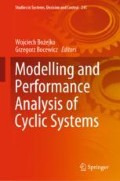Abstract
Flexibility and agility are central requirements for future manufacturing systems (especially assembly systems), because in most industries the product variety and the fluctuations in demand are still increasing. An increase of the degree of flexibility allows more efficient activities aiming at following the dynamically evolving markets. Such systems should be able to react to changes of product, demands, increased varieties of products requirements concerning reduced delivery times and increased product quality. Therefore, a strong focus on the flexibility of manufacturing and assembly systems leads to economic advantages for industrial companies in terms of the system investment cost. In particular, the cost related to the reconfiguration of the system.
Access this chapter
Tax calculation will be finalised at checkout
Purchases are for personal use only
References
Rossiter, J.A.: Model-Based Predictive Control: A Practical Approach. CRC Press, Bocca Raton (2013)
Prodan, I., Olaru, S., Stoica, C., Niculescu, S.-I.: Predictive control for trajectory tracking and decentralized navigation of multi-agent formations. Int. J. Appl. Math. Comput. Sci. 23(1), 91–102 (2013)
Gruzlikov, A.M., Kolesov, N.V.: Discrete-event diagnostic model for a distributed computational system. Merging chains. Autom. Remote Control 78(4), 682–688 (2017)
Polak, M., Majdzik, P., Banaszak, Z., Robert Wójcik, R.: The performance evaluation tool for automated prototyping of concurrent cyclic processes. Fundam. Inf. 60(1), 269–289 (2004)
Abrams, M., Doraswamy, N., Chitra, A.M.: Visual analysis of parallel and distributed programs in the time, event, and frequency domains. IEEE Trans. Parallel Distrib. Syst. 3(6), 672–685 (1992)
Seybold, L., Witczak, M., Majdzik, P., Stetter, R.: Towards robust predictive fault-tolerant control for a battery assembly system. Int. J. Appl. Math. Comput. Sci. 25(4), 849–862 (2015)
De Schutter, B., Van Den Boom, T.: Model predictive control for max-plus-linear discrete event systems. Automatica 37(7), 1049–1056 (2001)
Park, S.J., Lim, J.T.: Robust and nonblocking supervisor for discreteevent systems with model uncertainty under partial observation. IEEE Trans. Autom. Control 45(9), 2393–2396 (2000)
Witczak, M.: Fault Diagnosis and Fault-Tolerant Control Strategies for Non-linear Systems. Springer International Publishing, Berlin (2014)
Stetter, R., Simundsson, A.: Design for control. In: Proceedings of the 21st International Conference on Engineering Design, Vancouver, Canada, 21–25 Aug 2017, pp. 149–158. The Design Society (2017)
Seybold, L., Pieczyński, A., Paczynski, A, Stetter R.: Concept of an advanced monitoring, planning, control and diagnosis system for autonomous vehicles. In: Simani, S., Bonfé, M., Castaldi, P., Mimmo, N. (eds.) Proceedings of the 8th Workshop on Advanced Control and Diagnosis, ACD’2010, Ferrara, Italy, 18–19 Nov 2010, pp. 107–112 (2010)
Glaessgen, E., Stargel, D.: The digital twin paradigm for future NASA and US Air Force vehicles. In: 53rd AIAA/ASME/ASCE/ AHS/ASC Structures, Structural Dynamics and Materials Conference, Honolulu, Hawaii, 23–26 April 2012
Tao, F,; Zhang, M.: Digital twin shop-floor: a new shop-floor paradigm towards smart manufacturing. IEEE Access 5, 20418–20427 (2017)
Uhlemann, H.J., Lehmann, C., Steinheipler, R.: The digital twin: realizing the cyber-physical production system for industry 4.0. Proc. CIRP 61, 335–340 (2017)
Tao, F., Cheng, J., Qi, Q., Zhang, M., Zhang, Fangyuan, H.S.: Digital twin-driven product design, manufacturing and service with big data. Int. J. Adv. Manuf. Technol.D 94, 3563–3576 (2018)
Baccelli, F., Cohen, G., Olsder, G.J., Quadrat, J.P.: Synchronization and Linearity: An Algebra for Discrete Event Systems. Wiley, New York (1994)
Butkovic, P.: Max-Linear Systems: Theory and Algorithms. Springer, Berlin (2010)
Martin, H.: Transport und Lagerlogistik: Systematik, Planung, Einsatz und Wirtschaftlichkeit. Springer, Berlin (2016)
Stetter, R., Bertsch, S., Eckart, P. Paczynski, A.: Torque steering system for electrical and hybrid power trains. In: Proceedings of 13th EAEC European Automotive Congress, Valencia, Spain, 13–16 June 2011 (2011)
Baruwa, O.T., Piera, M.A., Guasch, A.: Deadlock-Free Scheduling Method for flexible manufacturing systems based on timed colored petri nets and anytime heuristic search IEEE transactions on systems. Man, Cybern. Syst. 5(45), 1–12 (2015)
An, Y., Wu, N., Chen, P.: Short-term scheduling of vehicle testing system using object petri net. IEEE Access 6, 61317–61330 (2018)
Ribeiro, G., Saldanha, R., Maia, C.: Analysis of decision stochastic discrete-event systems aggregating max-plus algebra and markov chain journal of control. Autom. Electr. Syst. 29(5), 576–585 (2018)
Majdzik, P., Akieleszak-Witczak, A., Seybold, L., Stetter, R., Mrugalska, B.: A fault-tolerant approach to the control of a battery assembly system. Control Eng. Pract. 55, 139–148 (2016)
Acknowledgements
The work was supported by the National Science Centre, Poland under Grant: UMO-2017/27/B/ST7/00620.
Author information
Authors and Affiliations
Corresponding author
Editor information
Editors and Affiliations
Rights and permissions
Copyright information
© 2020 Springer Nature Switzerland AG
About this chapter
Cite this chapter
Witczak, M., Majdzik, P., Lipiec, B., Stetter, R. (2020). Conflict Avoidance Within Max-Plus Fault-Tolerant Control: Application to a Seat Assembly System. In: Bożejko, W., Bocewicz, G. (eds) Modelling and Performance Analysis of Cyclic Systems. Studies in Systems, Decision and Control, vol 241. Springer, Cham. https://doi.org/10.1007/978-3-030-27652-2_7
Download citation
DOI: https://doi.org/10.1007/978-3-030-27652-2_7
Published:
Publisher Name: Springer, Cham
Print ISBN: 978-3-030-27651-5
Online ISBN: 978-3-030-27652-2
eBook Packages: EngineeringEngineering (R0)

